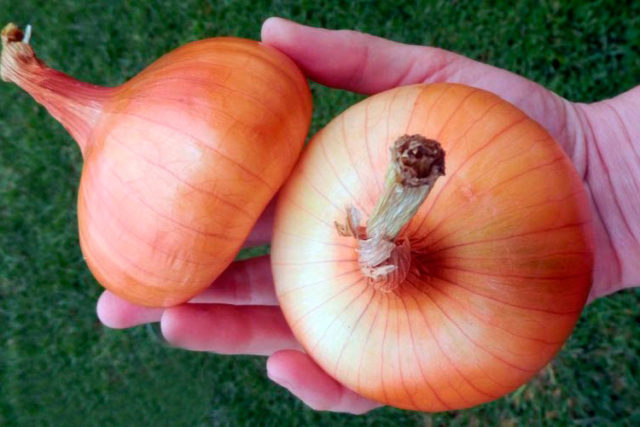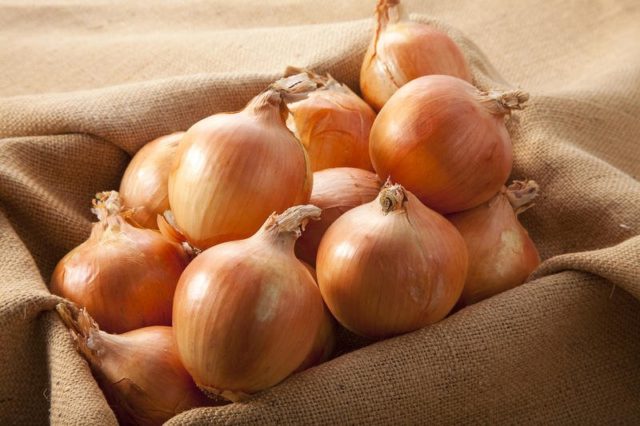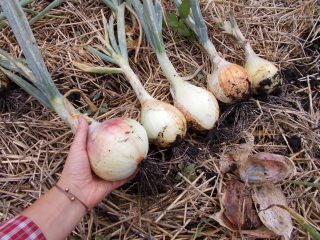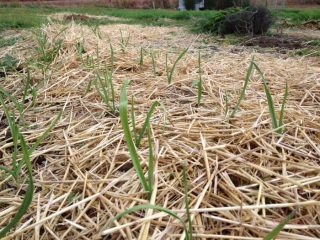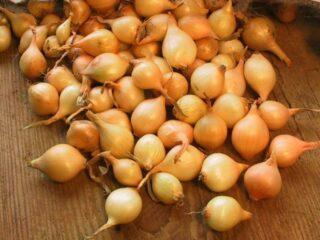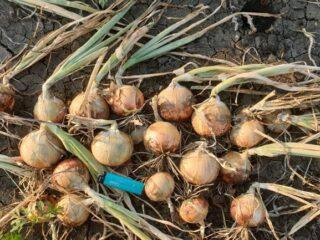Content
- 1 Breeding history of the variety
- 2 Description of the bow Stuttgarter Riesen
- 3 Variety characteristics
- 4 Planting and caring for onions
- 5 Growing onions Stuttgarter Riesen from seeds
- 6 Harvesting and storage
- 7 Onion breeding methods
- 8 Diseases and pests, methods of control and prevention
- 9 Conclusion
- 10 Testimonials
There are many varieties of onions in the collections of domestic and foreign breeders, and some of them require special care. Onion sets Stuttgarter Riesen is an unpretentious, high-yielding species. Due to its peculiarities, it is popular not only among Russian gardeners. It is grown on their plots by many plant breeders of the Near Abroad.
Breeding history of the variety
Stuttgarter Riesen is one of the most popular onion varieties. The high development result was achieved thanks to the painstaking work of breeders of the famous German company "Replacement Mauser Quedlinburg". To get a novelty, they used varieties with similar characteristics, while highlighting only their best properties. Onions were included in the Russian register of varieties approved for cultivation in the country in 1995.
Onions Stuttgarter Riesen are resistant to the effects of genetic mutations, during the existence of varietal qualities have been preserved. This contributed to its widespread adoption. On the territory of Russia, gardeners of all regions are engaged in the cultivation of the variety; they are attracted by its adaptability to different climatic conditions.
Description of bow Stuttgarter Riesen
Stuttgarter Riesen is a variety with high yields and versatility. Fresh salads, various dishes, preserves for the winter are prepared with it. Due to the content of dry substances, long-term storage in a dried or frozen form is possible. Distillation allows you to get healthy young greens.
It is an excellent remedy for fighting colds thanks to vitamin C, the main ingredient in onions.
Onion Sevok Stuttgarter Riesen: description
Medium to large onion heads are rounded with slightly flattened ends. Upon reaching ripeness, the scales acquire a yellow-straw or golden-brown hue. The taste is pleasant, medium pungency, strong smell.
Variety characteristics
Stuttgarter is distinguished by high varietal qualities.
Yield
This is a high-yielding crop of early ripening. The finished crop is obtained after 10 weeks when planting seedlings in the soil. When grown through sowing seeds, the period increases to 3.5 months.
The average bulb weight is 130-150 g. Under optimal growing conditions, it can exceed 200 g.
Due to the high yield of varieties from 1 m² with minimal maintenance, 5 kg of onions are harvested, if all requirements are met - up to 8 kg.
Disease and pest resistance
The Stuttgarter Riesen onion has a high resistance to diseases and pests.
Advantages and disadvantages of the variety
In the description of the onion variety Stuttgarter Riesen, positive characteristics are indicated, of which it is worth highlighting:
- high productivity;
- early maturation;
- unpretentiousness to planting and care;
- versatility in use;
- undemanding storage conditions;
- excellent preservation;
- resistance to many diseases and pests;
- the possibility of growing seedlings for greenery.
With so many advantages, Stuttgarter Riesen has several disadvantages. Onions are prone to rot if it rains frequently and is wet in summer. The process of peeling and cutting the onion is inconvenient due to its flattened shape. But, given the many positive qualities, you can ignore such trifles.
Planting and caring for onions
The process of planting Stuttgarter onions and care is almost the same as with other varieties.
Many gardeners believe that it is more efficient and easier to grow onion sets, so they prefer to use only this method.
Onion planting dates
A favorable period for planting the Stuttgarter Riesen variety seedlings is autumn or before winter. Often it is planted in the garden in the spring.
When to plant Stuttgarter onions in autumn
In the fall, seedlings are planted 30 days before the arrival of frost. The implementation of this process in the first decade of October will allow the vegetable to take root until the temperature drops sharply.
Garden bed preparation
The onion bed Stuttgarter Riesen should be in the sunniest place so that with the arrival of spring the soil warms up faster, the snow melts earlier.
Onions can grow in any soil other than acidic. But to obtain a rich harvest and large bulbs, areas with fertile soil, black soil or loam are selected.
The soil is fertilized with compost or humus, wood ash and superphosphate to improve its fertility and dug up.
Planting onions Stuttgarter Riesen before winter
Before you start planting the Stuttgarter onion before winter, it is sorted out and processed. Having got rid of rotten, broken and moldy bulbs, they leave samples of the correct shape, without significant damage.
Then they are heated at a temperature of + 42 ° C for 8 hours using a stove or central heating batteries. This process must be treated carefully so that the planting material does not dry out or overheat, which will lead to the absence of seedlings.
Many vegetable growers recommend that the planting material be disinfected in a solution with potassium permanganate or copper sulfate for 10 minutes, followed by daily drying. It is only necessary to provide that it is easier to endure a sharp cold snap for dry bulbs than for swollen ones. Also, such actions will help speed up the germination process.
For planting, prepare long holes, the distance between which is 0.25 m. Bulbs are placed there, the indent from one to the other should be 10 cm, lightly watered.
Further care
There are no special requirements for the care of the seedlings of this variety and its renewed species, Stuttgarter Stanfield. It is recommended to weed 2 weeks after planting before the onset of frost. So that weak plants do not interfere with the development of others, they are removed.
At the same time, the plant is fed with a solution that includes mullein or bird droppings and urea. This mixture can be replaced with universal fertilizers purchased from a specialty store. The procedure is repeated after 5 days from the day of the first treatment.
Mulching with peat, sawdust, dry leaves with a layer of 3 cm or more will protect the onion garden from the first frost.
Growing onions Stuttgarter Riesen from seeds
To obtain a full-fledged harvest within one season, vegetable growers use the following proven growing methods:
- Straight spring... For culture, the temperature is not terrible - 5 ° C. Sowing seeds in early spring will allow you to get a ripe crop at the end of the season.
- Podzimny... To prevent the vegetable from sprouting, it is optimal to send seeds to the ground when the first autumn frosts come.
- Growing seedlings in containers... Sowing time is the second half of February, March. Plants must be provided with additional lighting and all the rules of agricultural care must be followed.
To grow onions Stuttgarter Riesen, a garden is dug from seeds directly in the ground and rows are cut. The distance between them should be 15 cm. The onion is sown pointwise, which will help prevent overuse. To do this, every 10 cm, 2-3 seeds are placed in the hole.
Harvesting and storage
To prevent onions from overgrowing, do not take too long to harvest them. The first sign that it is time to harvest is the wilting and yellowing of the leaves. Full ripeness of onions is the main storage criterion.
The harvested vegetables are sorted, unnecessary roots and leaves are removed. They must be dried on sunny days right in the beds. In rainy weather, they are left in ventilated, dry rooms. A well-done harvesting process will keep vegetables throughout the winter.
Onion breeding methods
Stuttgarter Riesen does not belong to hybrids, which allows you to get seed on your own by planting several bulbs preserved from the previous season for pollination among themselves.
Diseases and pests, methods of control and prevention
The vegetable must be protected from damage by onion flies and rot. From the eggs of the pest laid on the onion beds, larvae appear, from which the inner part of the turnip suffers. The plant is threatened with decay and death.
Rot caused by excessive moisture is also very dangerous for the crop.
As preventive measures on the rows, they carry out:
- soaking the seed and sowing in a solution of potassium permanganate and salt before sending them into the ground;
- planting next to vegetables (dill, carrots) that protect onions from pests;
- annual replacement of the sowing site of the variety (crop rotation);
- timely loosening of the soil;
- autumn digging of the soil, which will entail the freezing of insects at low temperatures;
- mulching.
Conclusion
If the gardener wants to grow a good harvest of beautiful, tasty, juicy vegetables, the Stuttgarter Riesen onion sets are the most suitable variety for this.
This is possible due to its resistance to weather changes. It is great for both planting with seeds and sevkom. Just do not forget the basic recommendations for growing them, then a good result will be ensured.
Testimonials

